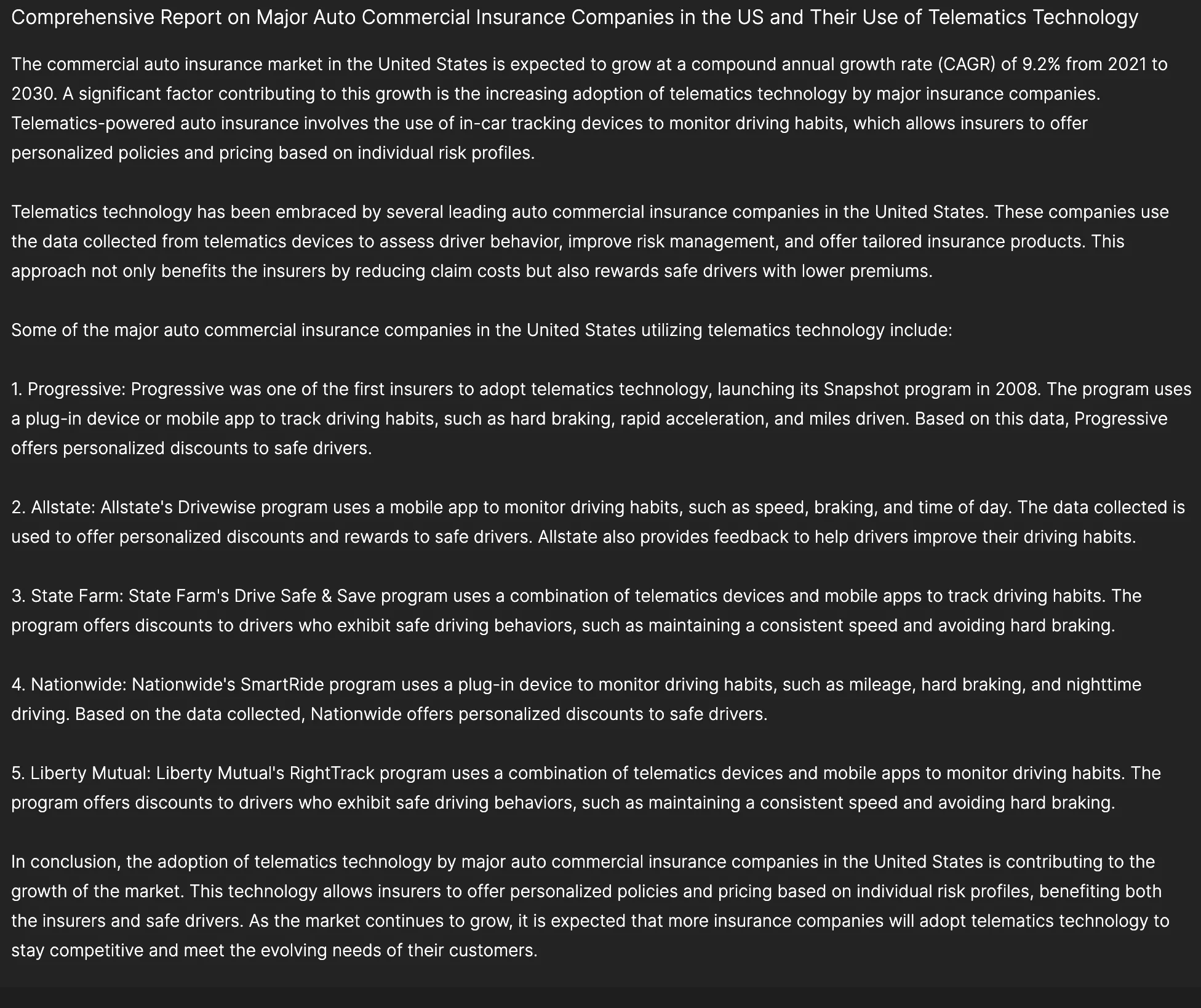There is a saying that I've heard as I grew up - "The answer lies in the question itself". It took me some time to get it but recently I saw it at a whole new level. But before I do that, let's talk about Prompts.
Prompt
Let's start with a simple prompt:
List down all the auto commercial insurance companies in the US with their strength and weaknesses.
It seems like a valid starting point, right? The prompt has all the right pointers:
Specific Domain (auto commercial insurance companies)
Geography (USA)
What kind of info is required (Their strengths and weaknesses)
And here's the result I got from Aomni (Which is like a hosted version of the Auto-GPT for user research, which is like a ChatGPT but on Steroids. Go check it out)
Company | Strength | Weakness |
|---|---|---|
Progressive Commercial | Largest commercial auto insurer, wide range of services, many potential discounts | Not mentioned. |
Nationwide | Customizable coverage, telematics service for small businesses. | Not mentioned. |
The Hartford | Best for fleets, offers FleetAhead telematics program. | Not mentioned. |
Farmers | Ideal for single vehicles and independent contractors. | Not mentioned. |
Auto-Owners | Best for discounts, and excellent financial strength ratings. | Not mentioned. |
Sentry | Best for large businesses, customizable commercial policies. | Not mentioned. |
Looking at the result, it's very okayish. I got a few companies and a short summary of their strengths. But the output is not that great. At first, I felt that the tool is not that great. But after a few minutes of thinking, I decided to take a different take on it. I went to ChatGPT and entered:
Expand this prompt better:
List down all the auto commercial insurance companies in the US with their strength and weaknesses
And got the following result:
Provide a comprehensive list of auto commercial insurance companies in the United States, along with an analysis of their strengths and weaknesses.
For each company, examine factors such as coverage options, pricing, customer service, financial stability, claim handling, and any unique features or services. Additionally, assess how well they cater to the specific needs of businesses and commercial fleets, and consider any regional or industry-specific strengths or limitations.
Notice how the prompt is a lot richer. It went deeper into what kind of report I wanted to create, and what are various factors to look for. It also added "comprehensive" to be more specific.
Here's the result I got from Aomni this time:
Company | Coverage Options | Unique Features or Services | Cater to Specific Needs of Businesses and Commercial Fleets | Regional or Industry-Specific Strengths or Limitations |
|---|---|---|---|---|
Progressive | Adjustable coverages, 24/7 service | Flexible billing and payment options, commercial claims adjusters, unlimited travel radius in most states | May not cater to specific industries | |
Travelers | Liability, physical damage, underinsured and uninsured motorists coverage | Serves both small and large fleets | Serves a broad range of customers | May lack industry-specific offerings |
Liberty Mutual | Risk control tools | May not provide extensive coverage options | ||
Nationwide Corp | Commercial auto insurance, commercial agribusiness insurance, workers' compensation | Nationwide Vantage360 telematics program | Caters to industries like construction and manufacturing | |
Berkshire Hathaway | Commercial auto insurance | May not offer specialized coverage options | ||
Old Republic | Commercial auto coverage through six specialty companies | Subsidiary Great West Casualty Co. specializes in services and insurance for truckers | ||
Zurich Insurance | Conventional and non-conventional motor insurance | Deductible programs, captive fronting, and reinsurance | May not cater to specific industries | |
Auto-Owners | Various insurance types | Discounts for paying in full, buying multiple policies, and using a telematics program to monitor fleets | May not have industry-specific offerings | |
Tokio Marine Group | Automobile insurance | Over 15 million domestic auto insurance policies in Japan | May lack a strong presence in the US market | |
Chubb Ltd | Commercial auto insurance, cyber, foreign casualty, management liability, and more | May not cater to specific industries |
(PS: I used ChatGPT to make that output as a table to make it readable 😛)
Take the following data and put it into a table with the following columns: Company, coverage options, pricing, customer service, financial stability, claim handling, any unique features or services., cater to the specific needs of businesses and commercial fleets, and any regional or industry-specific strengths or limitations.
<data>
remove columns that have no entries
As you can see the output got a lot better. Not amazing, but definitely something to get started at.
I need help in how to ask for help...
You might be like sure but how do I know if even my initial prompt to expand on is good enough? Good question and this is where it starts to get crazy. You can ask ChatGPT to help you come up with that by asking it in a way that it can help. Gulp, let me just show you the prompt (Thanks to Jonathan Matus for sharing this prompt):
Please forget all prior prompts. I want you to become my Prompt Creator. Your goal is to help me build the best detailed prompt for my needs. This prompt will be used by you, ChatGPT. Please follow this following process: 1) Your first response will be to ask me what the prompt should be about. I will provide my answer, but we will need to improve it through continual iterations by going through the next steps. 2) Based on my input, you will generate 3 sections. a) Revised prompt [provide your rewritten prompt. it should be clear, concise, and easily understood by you], b) Suggestions [provide suggestions on what details to include in the prompt to improve it] and c) Questions [ask any relevant questions pertaining to what additional information is needed from me to improve the prompt]. 3. We will continue this iterative process with me providing additional information to you and you updating the prompt in the Revised prompt section until it's complete. I want you to rate every prompt I give you or you produce. Give a rating 1 to 10. Add comments on what you think could have been improved about it. Do this for every prompt. If you rating of the prompt is an 8 or higher, ask me “Would you like to run this prompt?” With a menu choice of “Yes” or “No”. If I say “Yes” run the last prompt you suggested. If I say no generate me a better prompt. It is vital to make sure you run a prompt when I say “Yes”. Please continue this prompt until I say stop or you run the prompt. Thank you.

Now this is where it starts to get interesting, let's give it the same initial prompt and see if we can expand it. And here's the response:
Write a comprehensive report on the major auto commercial insurance companies in the United States, with a focus on their use of telematics technology. The report should cover the following:
An introduction to the commercial auto insurance industry in the US, including market size, growth, and key players.
An overview of telematics technology in auto insurance, including how it works and its benefits.
A review and analysis of the financial stability and ratings of each company, to provide an assessment of their reliability and ability to pay claims.
A comparison and contrast of the coverage options, premiums, deductibles, and other important features of each company's policies, with a specific focus on their use of telematics technology.
A review of customer satisfaction ratings and reviews to provide a sense of each company's overall customer experience.
An analysis of each company's use of telematics technology, including how they collect and use data, and any specific policies or discounts related to telematics technology.
An assessment of the strengths and weaknesses of each company's use of telematics technology, as well as any notable features or policies that set them apart from their competitors.
I asked it to add a few suggestions and here's the final prompt:
Revised Prompt: Write a comprehensive report on the major auto commercial insurance companies in the United States, with a focus on their use of telematics technology. The report should cover the following:
An introduction to the commercial auto insurance industry in the US, including market size, growth, and key players.
An overview of telematics technology in auto insurance, including how it works and its benefits.
A review and analysis of the financial stability and ratings of each company, to provide an assessment of their reliability and ability to pay claims.
A comparison and contrast of the coverage options, premiums, deductibles, and other important features of each company's policies, with a specific focus on their use of telematics technology.
A review of customer satisfaction ratings and reviews to provide a sense of each company's overall customer experience.
An analysis of each company's use of telematics technology, including how they collect and use data, and any specific policies or discounts related to telematics technology.
An assessment of the strengths and weaknesses of each company's use of telematics technology, as well as any notable features or policies that set them apart from their competitors.
I was pretty happy with it and tried it again. And the result is actually a pretty good report:

The answer lies in the question itself
And then I read this tweet today by Ryan Singer (Author of Shape Up):
Here's another example of shaping with an LLM. The a-ha moment (see thread) came from writing the prompt not getting the answers. Trying to articulate what I wanted and comparing against the "conventional wisdom" of the LLM helped me get to an innovative idea.
You can read the thread in more detail but that's where everything started to come back to this quote:
The answer lies in the question itself
If you start to think about how you frame your questions right, you'll be able to find your answers. The problem is we have become so lazy that we don't even ask our questions properly. Not only do we want the answers easily, but we are not even bothering to ask them the right way.
The right way to think about using ChatGPT for creative exploration is to uncover what is that you are really looking to get an answer for. Once you nail that, once you frame it correctly, it doesn't matter how you get the answer: googling it step by step, coming up with it on your own, or getting it from ChatGPT. You have broken down the problem in a way that is consumable, useful, and actionable. And that's what really matters.
Once you start to think of it this way, the whole battle of ChatGPT will hallucinate, it can lie, and it can make up stuff that goes out the window. You are not looking for answers, to begin with. That comes later. What you are looking for is "What is the right question here?"



